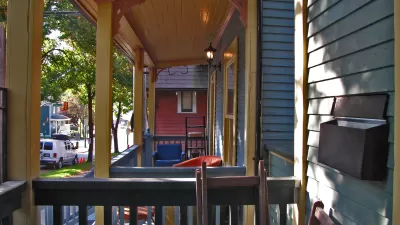Vancouver's liberalized laneway housing zoning is seen as a cost-effective and easy way to densify, make housing more affordable and reduce the city's carbon footprint. But not everyone is on board.
While some cities allow the construction of "garden suites" or accessory units on a case-by-case basis, Vancouver, BC is permitting them on any lot that is sufficiently wide and has access to a back lane:
"Vancouver... introduced a new policy a year ago that allows small houses to be built behind any single-family house in the city that has a lot wider than 33 feet as well as access to a lane or road. So far, nearly 200 applications have come in – a number that has made Vancouver a North American leader in enthusiasm for this new form of housing.
That all-out charge forward in Vancouver has produced backlash, though. At council meetings two weeks ago, when planners brought up an assessment of the program so far and suggestions for minor tweaks, 35 people showed up and about half were adamantly opposed, saying the new houses are so big that they're invading neighbours' privacy and blocking views."
FULL STORY: BC's Boom in Little Houses

Planetizen Federal Action Tracker
A weekly monitor of how Trump’s orders and actions are impacting planners and planning in America.

Restaurant Patios Were a Pandemic Win — Why Were They so Hard to Keep?
Social distancing requirements and changes in travel patterns prompted cities to pilot new uses for street and sidewalk space. Then it got complicated.

Map: Where Senate Republicans Want to Sell Your Public Lands
For public land advocates, the Senate Republicans’ proposal to sell millions of acres of public land in the West is “the biggest fight of their careers.”

Maui's Vacation Rental Debate Turns Ugly
Verbal attacks, misinformation campaigns and fistfights plague a high-stakes debate to convert thousands of vacation rentals into long-term housing.

San Francisco Suspends Traffic Calming Amidst Record Deaths
Citing “a challenging fiscal landscape,” the city will cease the program on the heels of 42 traffic deaths, including 24 pedestrians.

California Homeless Arrests, Citations Spike After Ruling
An investigation reveals that anti-homeless actions increased up to 500% after Grants Pass v. Johnson — even in cities claiming no policy change.
Urban Design for Planners 1: Software Tools
This six-course series explores essential urban design concepts using open source software and equips planners with the tools they need to participate fully in the urban design process.
Planning for Universal Design
Learn the tools for implementing Universal Design in planning regulations.
Heyer Gruel & Associates PA
JM Goldson LLC
Custer County Colorado
City of Camden Redevelopment Agency
City of Astoria
Transportation Research & Education Center (TREC) at Portland State University
Camden Redevelopment Agency
City of Claremont
Municipality of Princeton (NJ)



























